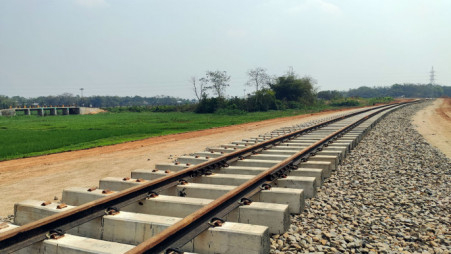Slow Trains, Broken Roads — A Journey Through Suffering and Neglect
Published: 07:35 PM, 07 October 2025
Sylhet- Akhaura Railway Connection Still Waiting for Development

Sangram Datta: Morning light had barely touched the rusted rails of Moglabazar station when another tragedy struck. The Udayan Express, bound for Sylhet, suddenly derailed — its carriages tilting like wounded beasts. Within minutes, rail communication between Sylhet and the rest of the country came to a standstill once again.
Passengers screamed, scrambled, some trapped inside twisted metal. Locals rushed in barefoot, pulling at doors, carrying the injured out in their arms. And amid the chaos, an old question echoed: Why does this keep happening?
For years, the railway connecting Sylhet to the rest of Bangladesh has been a relic of the past — a remnant of British colonial infrastructure held together by rust, bolts, and hope. The line from Akhaura to Sylhet rattles and groans under the weight of modern trains. There are no modern signaling systems, no upgraded tracks — only a tired network waiting for disaster.
When the Rails Stop, Sylhet Stops Breathing:
A derailed train in Sylhet is not just an accident. It’s a full stop — an abrupt silence that ripples across the region.
“Whenever the trains stop, we become cut off from the whole country,” says Abdul Karim, a resident of Sylhet city. “The roads are broken, buses are overcrowded, and ticket prices rise every week. Traveling has become torture.”
Roads That Break, Journeys That Never End:
If the railways are old, the roads are worse.
The Dhaka–Sylhet highway, now under renovation, is a corridor of congestion — a 17-hour nightmare through dust, fumes, and frustration.
“Last week, I left Dhaka at 11 p.m.,” recalls one traveler. “I reached Sylhet the next evening. Children were crying, the elderly fainted. It was hell.”
For most Sylhetis, flying is not an option. Airfare remains beyond reach for the middle and working class. What remains is a choice between exhaustion and despair — the road or the rail, both crumbling.
The Railway of Rust and Risk:
Railway engineers, speaking off record, admit what passengers already know: the Akhaura–Sylhet line is unsafe.
Many sleepers have rotted. Bolts are missing. Hooks are loose. Bridges sway under the slightest pressure.
“We hit the tracks with hammers to check if they’ll hold,” says one railway worker. “But real repairs? Those never happen.”
Accidents have become routine. Each time, there’s outrage, investigations, and then silence — until the next derailment.
A Train That Never Came: Sylhet–Mymensingh’s Forgotten Dream:
Sylhet and Mymensingh — two regions deeply connected by trade, culture, and family ties — still have no direct train line.
For decades, residents have demanded an intercity service linking the two divisions. Proposals were made, promises given, but progress never followed.
Experts say such a connection could transform the region — boosting commerce, healthcare access, and educational exchange. But the dream remains trapped on paper.
The Paradox of Prosperity: A Rich Land, A Neglected People:
Economically, Sylhet is a powerhouse.
It fuels the nation with its natural gas, tea estates, and stone quarries. Its expatriate workers send billions in remittances each year. Yet, in return, Sylhet receives little in infrastructure investment.
While Dhaka gleams with expressways, flyovers, and metro rail lines, Sylhet’s trains run on tracks that belong in a museum.
“It’s not just neglect,” says one economist. “It’s inequality. You can’t build a balanced country by leaving one region behind.”
Political Promises, Administrative Silence:
The Akhaura–Sylhet Dual Gauge Double Line Project — a long-awaited modernization effort — was supposed to change everything.
Had it been completed, trains could move faster, safer, smoother. But a decade later, the project remains mired in bureaucracy and delay.
Government after government has promised progress, yet the rails remain broken. Each postponement deepens public frustration.
“When will Sylhet’s turn come?” people ask. The answer, it seems, is lost somewhere between paperwork and politics.
Inside the Train: A Journey Through Neglect:
A ride from Sylhet to Dhaka tells its own story.
Hot air seeps through broken windows. Air conditioning units hang lifeless. Toilets overflow. Passengers squeeze into aisles, sit on the floor, or cling to the doors for hours.
“We buy tickets, but we stand the whole way,” says one elderly man. “This isn’t travel — it’s punishment.”
The contrast is striking: a region that powers the nation, forced to travel in carriages that barely hold together.
Waiting for Change:
For the people of Sylhet, development is not a privilege — it’s a long-overdue right.
They do not ask for luxury, only for equality — for safe roads, reliable trains, and a voice in the country’s progress.
If the government modernizes Sylhet’s railway and repairs its highways, it will not just ease the region’s suffering — it will ignite growth across the northeast.
Until then, the question remains painfully alive:
How long must Sylhet — the land that fuels the nation — ride on the broken tracks of history?
The answer, everyone knows. But no one seems ready to listen.




